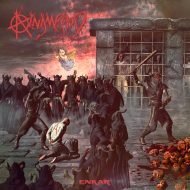 Metal is a strange beast. What about it touches the hearts and minds of people from every part of the world? More than many forms of music, it transcends race, beliefs and culture, yet still remains a pariah in the eyes of many. Dwelling in the underground despite many bands now having a prominence on the world’s stage, it is loved, worshipped, derided, feared and shunned. Yet for decades, its’ fans and bands seek metal out for something often more than mere entertainment. The power of expression, catharsis and a place of solace are crucial for many.
Metal is a strange beast. What about it touches the hearts and minds of people from every part of the world? More than many forms of music, it transcends race, beliefs and culture, yet still remains a pariah in the eyes of many. Dwelling in the underground despite many bands now having a prominence on the world’s stage, it is loved, worshipped, derided, feared and shunned. Yet for decades, its’ fans and bands seek metal out for something often more than mere entertainment. The power of expression, catharsis and a place of solace are crucial for many.
The Middle East is generally not known for its’ output of metal bands. While some forms of Western influenced music are starting to become accepted it is still an underground prospect and metal is more likely to be treated as taboo. The themes and passion that can be expressed by metal bands leave them potentially risking their lives, especially when the topic turns to religion or criticism of the state. Saudi Arabia’s AlNamrood are a prime example of a band whose desire for self-expression surpasses their fear of authority. Despite new release “Enkar” being their sixth album, they have never played to an audience. Their members are anonymous, only going by pseudonyms lest their identities land them in hot water with the authorities whose punishment could extend to a death sentence. This band is not only metal, they’re black metal and their subject matter is not welcome in their own country. Suddenly, the term “underground” takes on a far more poignant meaning. Still, they live for their art and so, to “Enkar”…
Mystical, exotic Middle Eastern tones abound before a rage fuelled vortex on opening track “Nabth”. Whilst early thrash and black metal influences are obvious, the unmistakable uniqueness of their heritage leaves indelible marks over this track. Hints of Slayer’s “Mandatory Suicide” adorn the opening riffs in the groove of “Halak”. The band cleverly fuse traditional instruments and vocal tone into classic black metal structures, equally well displayed on “Xenophobia” which one can only imagine would incite circle pits given the opportunity.
The belly of the album is a turn towards a more identifiable black metal sound. There’s a loose quality that retains the raw edge reflective of how the band must surely exist. The drumming is a furious affair, at times sounding like Phil Taylor era Motörhead. The sirens and gunshot introduction to “Ensaf” are perhaps more relevant than most sound effects before a dense sensory assault. The vocals from Humbaba have an honesty and emotiveness very much in the spirit of Max Cavalera turning from defiance and desperation to condemnation. A return to the sounds of their homeland comes in the shape of instrumental track “Egwaa” which is more like a sonic journey back through time to a world unimagined. Hauntingly beautiful at times, it proves to be a wonderful starting point for the album’s remaining tracks which are both a swirl of rhythm but a total immersion into a culture. Heady auras and echoes to an ancient past permeate songs like “Esdraa” where a certain grandeur oversees what are still driving, aggressive, dark tones.
Put very simply, this album feels inspired and motivated. Apart from the honesty of its’ contents, the artwork is a significant feature. A singular figure with an “A” on his back awaiting his fate as fellow incarcerated men oversee the extremity of their circumstance and underpin the reality within which a band like this must create. I have to admit to being a newcomer to AlNamrood. Fans of metal, irrespective of genre should listen to this for its importance as a document of defiance, art and self-expression.
(8/10 Johnny Zed)

Leave a Reply